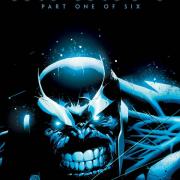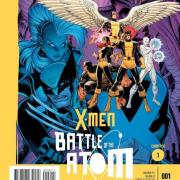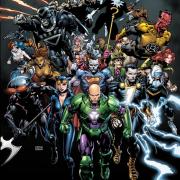Last week, the comic industry celebrated the release of the opening chapters of Forever Evil, DC's newest event, and Battle of the Atom, the latest X-Men crossover, as well as the second chapter of Infinity, Marvel's other big event. Luckily, we’re here to help sort out which comics are great, which are okay and which are worth passing.
Forever Evil
You'll like this book if: You like Geoff Johns events.
You'll dislike this book if: You want resolution from DC's last big event, Trinity War.
Tell me if you've read this Geoff Johns event before. We start off with a protagonist being affected by a cataclysmic, worldwide threat, before panning out to show how the rest of the world reacts. By the end, a hero is sacrificed in the opening issue to show how bad the villains are. It's how Johns opened Infinite Crisis, it's how he opened Blackest Night and it’s how he’s opened Forever Evil.
After a decent opening scene with a wink towards fans of a certain Blue Beetle, Johns sticks to a well-worn outline to start off his new Forever Evil event. While the book doesn't resolve Trinity War's cliffhanger ending, it's clear that the Crime Syndicate of America is in charge and wreaking havoc upon the world, which will be followed up in several DC books next month. While the stakes introduced by Johns in this issue are high, there's no real suspense due mainly to Johns treading a familiar plot and his weak dialogue. It's a problem that plagued Trinity War as well, one that prevents either event from standing out.
Art-wise, David Finch is still David Finch. I counted at least two cases of jello spine syndrome, but otherwise, it's OK art. I'm not a fan, but your own mileage will vary based on past experiences.
Overall, this book is very much a known quantity. If you're a fan of DC's current output, or like Johns' other events, I don't see why you wouldn't like Forever Evil.

Infinity
You'll like this book if: You're reading Avengers and New Avengers right now, or enjoy comics with the pacing of a jackrabbit.
You'll dislike this book if: You don't see the appeal of the Inhumans, or think "big" events should be expounded upon.
The main Infinity comic is an outline of plot points with pretty art attached. Infinity #2 opens with brief recaps of the latest issues of Avengers and New Avengers and doesn't slow down much from there. While people have ribbed Marvel for its decompressed events, this book is almost hyper-compressed. Epic wars are waged, ultimatums are issued and planets die in a few pages, all in the blink of an eye, with very little room for the reader to care.
Jerome Opena and Dustin Weaver's pencils are disappointing as well. Weaver's artwork features characters with bulbous heads and disproportionate limbs while Opena's art is hurt mainly by drab color choices that make entire pages look as if they were covered with a thin layer of dust.
I didn't like the opening chapter, and the second (or fourth if you count tie-ins) is just as much of a disappointment. It does have a nifty, if understated, cliffhanger, though. I have a feeling Infinity will be one of those events where the whole will be greater than the sum of its parts.

Battle of the Atom
You'll like this book if: You like the current X-books, or you enjoy well-crafted superhero stories.
You'll dislike this book if: You dislike Jean Grey, time travel stories, or how dysfunctional the X-books are.
The opening chapter of Battle of the Atom lays out the basic premise of the crossover: The original X-Men (who are traipsing around in the current day) tempt fate in a deadly battle against Sentinels, leading the present X-Men and a new team of future X-Men to try to send them home. The second chapter introduces the future team a bit farther and then introduces a new wrinkle to the plot, which will probably lead to more conflict down the road.
In the opening chapters, both written by Brian Bendis, characterization reigns supreme. From Kitty Pryde to Scott Summers to a mercifully brief dose of Deadpool, each character has a unique voice and motivation, turning a relatively simple time travel plot into a joy to read. At the center of the story is Jean Grey, whom Bendis has built up into a fresh and exciting character in his All New X-Men series. Bendis' Grey is a far cry from her older, near perfect self, and it's fantastic. Also, seeing Cyclops' Uncanny X-Men team up with another X-Men team without reminding readers of the travesty that was Avengers vs. X-Men is a delight. Frank Cho's art is, as always, phenomenal. Stuart Immonen's art in the second chapter felt a bit rushed, but is still heads above most of his peers.
Unless you hate the X-Men, this is the event of the summer. The X-Books have generally excelled at crossovers in recent years, and this appears to be no exception.
To Sum Up: Fans of good comics should pick up Battle of the Atom, fans of safe comics should pick up Forever Evil and fans of emotionless strings of plot points should pick up Infinity.

